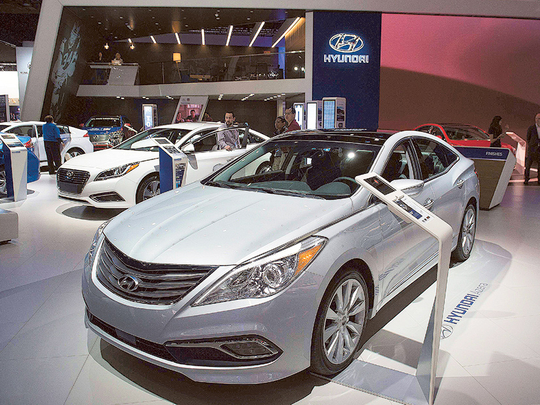
Seoul: Hyundai Motor Co. and affiliate Kia Motors Corp said they will spend $3.1 billion in the US in the next five years, joining other vehicle manufacturers in announcing investment plans amid threats from President-elect Donald Trump of higher levies on auto imports from Mexico.
The planned US investment by South Korea’s two largest automakers is about 50 per cent more than the $2.1 billion they spent in the previous five-year period, Hyundai Motor President Chung Jin-haeng told reporters in Seoul on Tuesday. The group is considering building a new factory in the US and may produce Hyundai Motor’s upscale Genesis vehicles and a US-specific SUV in the country, said the executive, who also oversees the strategic planning for Kia.
“We expect a boost in the US economy and increased demand for various models as President-elect Trump follows through on his promise to create one million jobs in five years,” Chung said. “We will actively consider introducing new models that have increasing demand and profits.”
Hyundai Motor and Kia join a growing list of automakers announcing investments in the US, even though they have yet to be singled out by Trump. Toyota Motor Corp, Ford Motor Co. and Fiat Chrysler Automobiles NV said this month they’ll spend on US plants after the president-elect threatened for months to slap Mexico-built vehicles with a 35 per cent import tax. Carmakers are eager to cooperate with the incoming administration as they prepare to ask for favours including weaker fuel economy rules and lower corporate taxes.
General Motors Co., the biggest US automaker, plans to announce on Tuesday it will invest $1 billion in US plants over several years, according to a person familiar with the matter. The Detroit-based carmaker expects to add or retain 1,000 jobs at several existing facilities, said the person, who asked not to be identified because the matter is private.
Hyundai and Kia will invest about 30 per cent to 40 per cent of the $3.1 billion on new technologies such as autonomous driving and green cars. The rest will be spent on facilities and adding new models, according to the company.
Hyundai has been considering expanding its plant in Montgomery, Alabama, which produces the Sonata, Elantra sedans and Santa Fe crossover. The factory is running at its top capacity of 370,000 cars a year. Kia’s factory in West Point, Georgia is also at full tilt, producing 360,000 units of the Optima sedan and Sorento SUV a year.
Kia opened a new $3 billion, 200,000 unit-a-year production line in Mexico two months before the US presidential election, with plans to increase capacity there to 300,000 units this year and to 400,000 vehicles by the end of 2018.
The automaker may add a new model to the plant in the Mexican state of Nuevo Leon, though the decision isn’t final and the company has “flexibility” on its strategy, Chung said. Kia is targeting to export 80 per cent of cars made in Mexico, mainly to the US and Latin American markets.
Hyundai-Kia has no additional plans to invest in Mexico and will not transfer production or jobs from the US to Mexico, according to a company spokesman.
“The US market is strategically a very important market for us and success or failure there is a barometer of our success globally,” Chung said. “Our interest in the US market is consistent regardless of the government of the day.”












